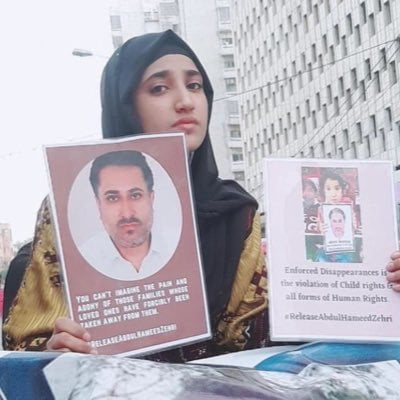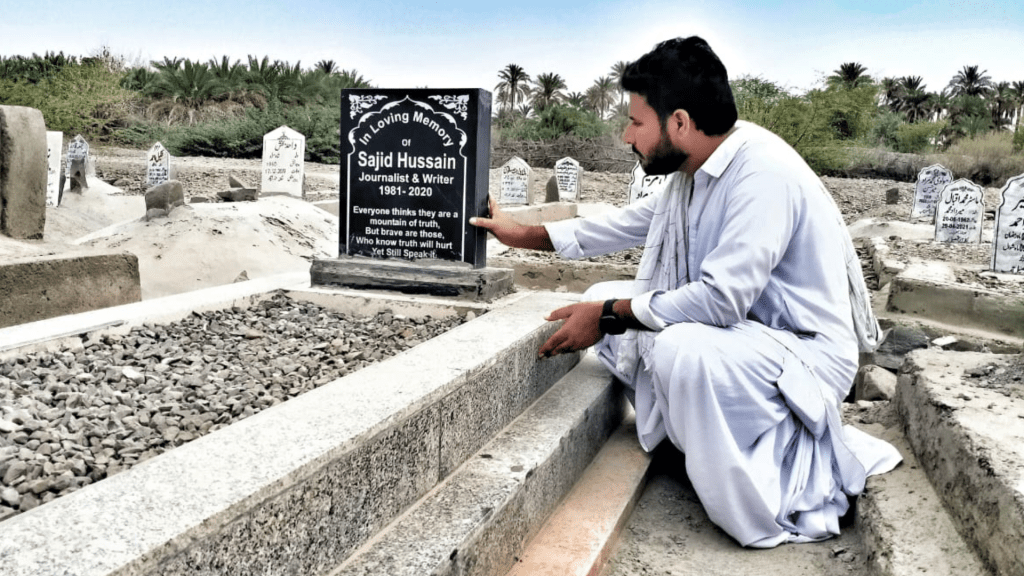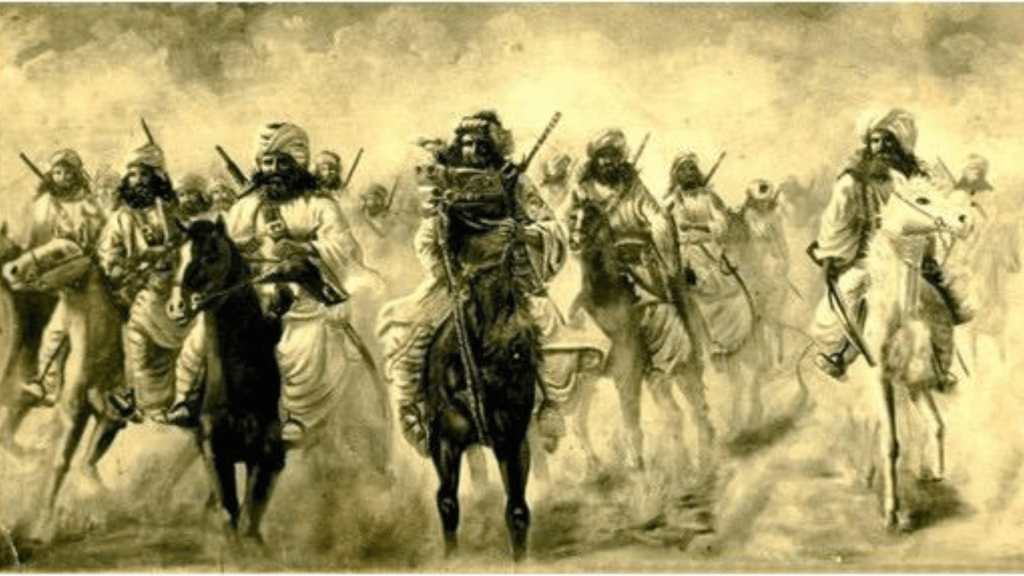In 2013, Saeeda Hameed became the first girl in her family to leave her hometown of Zehri in Khuzdar district of Balochistan to pursue an education in the cosmopolitan city of Karachi. Other girls of her age in the family had already got married and mostly looked after their children. Saeeda now goes to university and enjoys more freedom. This was possible because of the will of her father, Abdul Hameed, who had envisioned a happy future for his family, not knowing that his girl would one day be compelled to focus on his release from the illegal custody of Pakistan’s intelligence agencies rather than spending time on her university assignments.
Saeeda’s father was abducted on April 10 last year. Six secret agents raided their house in the middle of the night and, after confirming Abdul Hameed’s identity, whisked him away. “The agents introduced themselves as police officers. They told us that it was a routine ‘check-up’ and that they would let my father go after checking his identity documents in their system. A moment later, when I came down, I saw that the agents pushed my father onto one of their pickup trucks and drove away,” said Saeeda. To this day, Saeeda does not know why. “In a society where males decide our fates, studying in a university is a privilege. Unaware of the dangers, I carried on with my daily life in Pakistan, I was living my dream life, but then reality hit hard,” she said.
When the family had moved to Karachi in 2013, Hameed rented an apartment, but he himself went to the United Arab Emirates and invested in a maintenance business. But in 2020, when the Covid-19 pandemic affected the world, his small business was one of the many that went bankrupt. He returned to Karachi. With the exponential rise in the inflation rate in Pakistan, he soon found himself struggling in the expensive city of Karachi. Saeeda’s younger brother had to quit his studies to find a job so that the family could survive. Nowadays, he runs a water filtration shop in partnership with one of his friends.
After Hameed’s abduction, the family rushed down to get the CCTV footage from the security guard of the building. The guard told them that the abductors were from the Inter-Services Intelligence (ISI) who had broken into the security room of the building and taken all the CCTV footage with them.
Saeeda went to the area police station and filed an application about her father’s enforced disappearance. Initially, the police refused to file any case against the country’s spy agencies and warned the family about the consequences, but on Saeeda’s insistence, they had to accept the application. However, the police have not yet investigated the case.
“Within a week of my father’s disappearance, some people who are close to the military started appearing at my uncle’s home in Zehri. They tried to convince my uncle that filing cases would bring more damage to the family and if we stayed silent, they would bring my father back in a month,” said Saeeda. A month later, another military henchman assured the family that Abdul Hameed would be back in three months. “Of course, he lied,” she said.
One day, a man appeared in Saeeda’s brother’s shop. He was wearing a cap and sunglasses. His face was covered and he introduced himself as a secret agent. “The person insisted on meeting my mother and said that he had a message from my father. My brother brought him to our house. He said that he has an offer for us. If we paid them four million rupees, they would release my father. Two million and he would arrange a phone call and another two million would be my father’s freedom price. In short, ISI is demanding ransom for the release of my abducted father,” she said.
Saeeda told him that they did not have the money. But the man had all the information about the family’s properties. “He proposed that we sell our ancestral lands in Zehri. With this demand, it gradually unfolded that the main purpose of the enforced disappearance of my father was to force us to sell our ancestral land to a military henchman in Zehri for a cheap price. And then give this money to the ISI officer as a bribe for the release of my father. It was actually a land-grabbing operation where the ISI person would get the money and the military henchman the land, which our family had not been willing to sell,” said Saeeda. The man then left after saying that he would call them a week later and ask about their decision to pay him the four million rupees.
Saeeda’s mother, Bibi Fatima, received the call from a private number. The same voice echoed from the other end and inquired about her decision. Bibi Fatima said that she could not sell the land since it was not in her authority to do so. “The man then threatened my mother and asked her to be ready for the consequences,” said Saeeda.
When eight months passed and there was still no news of Abdul Hameed’s whereabouts, Saeeda conducted a press conference about her father’s disappearance and demanded his safe return. She said that after she had highlighted her father’s case, the military henchmen once again started appearing at her uncle’s house and repeated the warnings about the consequences of continued online or other campaigns for Abdul Hameed’s recovery.
“I cannot sit at home anymore. I can’t see my mother’s and siblings’ faces. In Pakistan, the system is corrupt and discriminative. It’s manipulated to work in the favour of the military and the secret agencies when they act with impunity against innocent civilians. The very first thing it destroys is one’s dignity,” said Saeeda. According to her, Abdul Hameed was not involved in politics. He was not an activist. “His only ambition in life was educating us and for that, he worked hard. His crime was that he came from a district where the military-backed tribal chiefs control every aspect of life. Neither the military nor the sardars want the common man to prosper and slip out of their grip.”
Abdulla Abbas is executive director of Human Rights Council of Balochistan. He lives in exile in Germany and can be reached at @AbdullahAbbas



